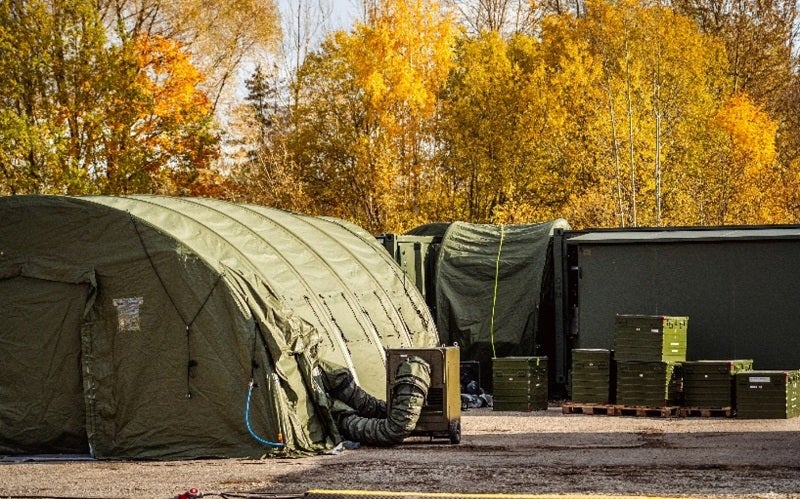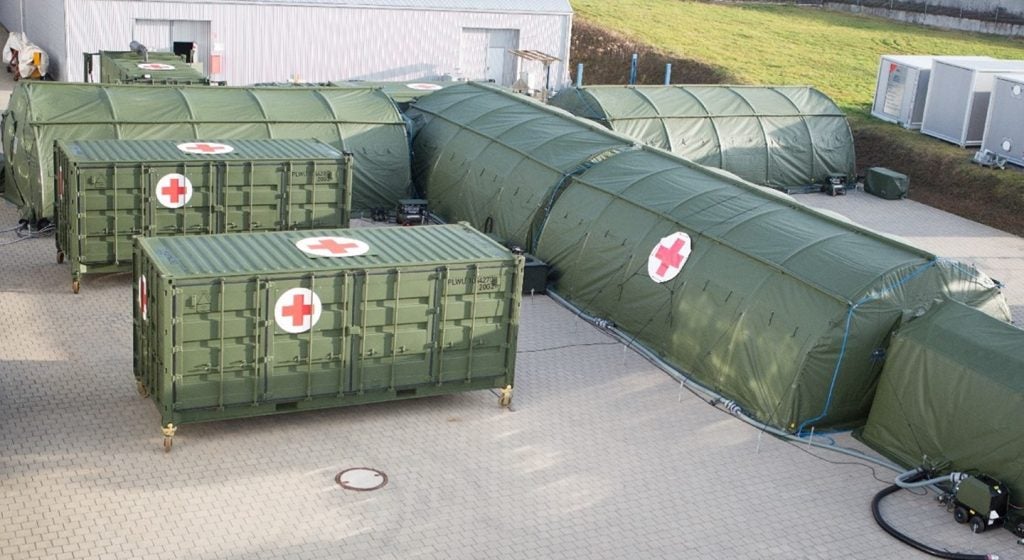There is more to war than guns, bullets and drones – combatants must also think of the medical resources needed to support and sustain their troops on the frontline.
As part of this human-centric outlook in its war against invading Russian forces, Ukraine’s Ministry of Defence has placed an order for eight Forward Surgical Team (FST) stations.
Rheinmetall, the German automotive and arms manufacturer, sits at the heart of the scheme. The supplier anticipates its delivery to begin in 2024 and conclude by the end of 2026.
While the financial cost is undisclosed, the company hints that its value lies within the “medium double-digit million euro range”.
Essentially, FSTs are container-based rescue units for mounted operations – Rheinmetall adds that it will also provide three HGVs from its MAN Military vehicles family for the task, including trailers.
One Rheinemtall FST consists of six containers each, five of these are connected to each other. Each container has its own triage-area while sharing a reception, an x-ray shelter, a surgery preparation area, a surgery shelter and an intensive care unit.
The sixth container is an auxiliary unit that houses a power generator while water tanks keep the system in service independently for at least two days.
Building on continental medical support
Ukraine’s latest order expands on the medical support deliveries the embattled nation accepted from a group of European allies. Estonia and Iceland collectively gifted a field hospital to the war-torn nation in November last year, and the German government similarly provided two field hospitals according to the its list of assistance to Ukraine.
Germany continued to bolster this infrastructure by financing the production and delivery of two Rheinmetall FSTs, worth €4m ($4.36m) each, in June 2023.

This included 32 beds for patients, of which eight are for intensive care. In addition, ten Ukrainian soldiers underwent a two-week training for the assembly and disassembly of the complex as well as transportation and operation of the hospital. Two rescue units of the current order will be delivered by Rheinmetall by the end of 2023 and beginning of 2024.
Such operations allow lifesaving procedures to be carried out close to the battle lines on badly wounded soldiers, stabilise patients and prepare them for transport to medical units elsewhere.
The commitment came under the federal government’s ‘Enable and Enhance’ initative, set-up in 2011, for the purpose is to “enable regional actors to provide security and stability in their own neighbourhoods,” described the German government.
Human-centric approach to war
Value on the the individual soldier seems to be a Western-style approach to conducting war, GlobalData Defence Analyst, Tristan Sauer, noted in a discussion on the relationship between high command and troops at the tactical level.
Western training principles in which responsibility trickles down to the lower levels of infantry is where, Sauer says, “the divide comes between the quality of the Russian and Ukrainian forces.”
This sparks a quality versus quantity debate, in which Ukrainian forces are demonstrating the success of the former, while the latter proves to be an enduring Soviet-era strategy.
Given Russia’s indiscriminate strikes against military and civilian targets alike – such as the destruction of a children’s hospital in June, just before the Nato summit began – it appears the Eastern adversary treats the lives of belligerents with contempt.
This could be said to extend to Russia’s own forces, given its meatgrinder tactics employed in Bakhmut and Avdivvka throughout 2023-4, and the subsequent losses they have sustained (as of June 2024, the figure reached up to half a million losses).









